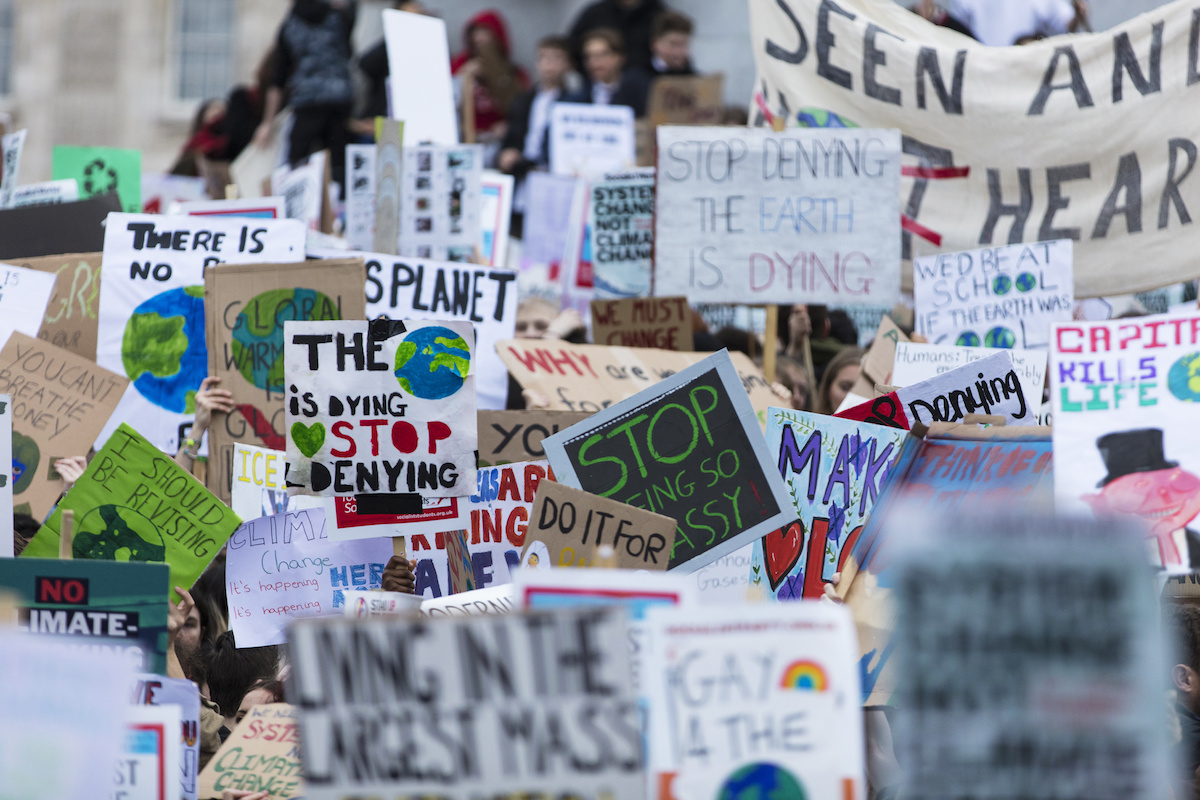10 Eye-Opening Films, TV Shows and Books on Climate Change

Earth Day takes place every year on 22nd April, and before you groan, “not another one”, this awareness event hasn’t just been concocted to boost Hallmark sales.
Its legacy begins in 1969, at the height of the anti-Vietnam war movement, when peace activist John McConnell first proposed the idea of a day to honour the Earth at a UNESCO Conference in San Francisco. On the first celebration in 1970, more than 20 million people poured out on the streets, with the first Earth Day remaining the largest single-day protest in human history.
Originally focused in the United States, it has since become an international event, with several landmark events in human history occurring on the day, including the 2016 Paris Agreement signed by 197 countries, which set a number of goals to drastically reduce carbon emissions and combat climate change.
This sort of environmental action is the foremost concern of organisers, and so to celebrate the annually historic event, we’ve decided to round up 10 films, books, and TV documentaries that have enlightened us on the climate crisis and helped inspire us to push towards positive action for the good of the planet we call home.
Seaspiracy
Seaspiracy isn’t directly about climate change. It’s about overfishing. But as with most things related to climate change, it shows how careless and destructive actions can have far-reaching consequences.
Directed and narrated by 27-year-old British filmmaker Ali Tabrizi, and produced by the team behind Cowspiracy (more on that gem later), the film shows us salmon farms riddled with disease, wild fish being fed to farmed, and wide plains of ocean turned into garbage plains. At nearly every step Tabrizi is met with resistance, a sign that those inflicting the destruction understand, and are completely complicit in, the havoc they are wrecking.
As anyone familiar with rewilding arguments will tell you, the ecosystem is in a delicate balance. The climate crisis rests on the protection of this balance.
The Uninhabitable Earth
Written by journalist David Wallace-Wells, 2019 book The Uninhabitable Earth fleshes out an earlier piece Wallace wrote for New York magazine, in which a worst-case scenario of global warming’s damage is painted. While some might call it overly pessimistic, the account is no less chilling, and details in horrific detail partly what we already know will happen.
Rising sea levels, extreme heat events, extinctions, disease outbreaks, fires, and droughts; we’ve already seen the changes in how grave our concerns should be.
Our Planet
The follow-up to BBC’s enormously successful Planet Earth, this Netflix documentary series sees narrator Sir David Attenborough take us on another journey around the world, only with a heightened sense of urgency as far as the climate crisis undertones (now overtones) are concerned.
We see polar bears struggling on ever-diminishing ice caps, turtles entrapped by discarded plastic, whole forests, and all the wildlife that live in them, torn to the ground. “Wildlife populations have fallen by an average of 60 percent,” says Attenborough in the opening credits. “The stability of nature can no longer be taken for granted.”
The Overstory
Most novels that take on environmental themes focus on a potential dystopian future (see Corman McCarthy’s haunting The Road). But The Overstory by Richard Powers, a Pulitzer prize winner no less, starts by looking deep into the past, the mid-19th century to be precise, as it follows the interweaving lives of five trees and the nine Americans who base their lives around them. Deforestation is a near-constant concern, especially as the industry ratchets up a gear in the modern day.
In sum, The Overstory is a complete epic, with many critics comparing it to Moby Dick, only with Douglas firs and coastal redwoods.
2040
Just as The Uninhabitable Earth visualises a world in flames, 2040, a documentary film by filmmaker Damon Gameau imagines a future where climate change has been solved.
Structured as a letter to his daughter, the film sees Gameau investigate several ingenious solutions from solar micro-grids providing self-sufficient energy for communities in Bangladesh to the growing popularity of ride-sharing within city centres. The result is accessible, informative, and optimistic; an ode to the power of positivity.
Fire In Paradise
In November 2018, the town of Paradise was ablaze, a horror story streamed around the world as the state of California saw the deadliest and most destructive wildfire in its history. This relatively short, 40-minute documentary detailing the events is a hard but necessary watch, punctuated by heart-wrenching interviews with the people who lost their friends and homes.
Partial blame for the destruction is laid at the feet of the Pacific Gas and Electric equipment that sparked the fire, but the real issue is the increasingly dry weather, brought on by unrelenting changes in climate patterns which will likely result in many more Paradise’s to come.
This Is Not A Drill: An Extinction Rebellion Handbook
Climate change is real, that much we know. But what can we do about it? Allow global environmental movement Extinction Rebellion to guide you, with a series of hard-hitting essays from scientists and psychologists, politicians, and economists.
The result is an empowering collection of actionable advice — including ways to feed a protest — which might not have every reader heed the call to arms, but will certainly have you making sure you’ve got your recycling bin in order.
Kiss The Ground
Narrated by actor and eco-warrior Woody Harrelson, this information-packed documentary (available to watch on Netflix) positions the ground we walk on as a key player in the fight against climate change, due to soil’s capacity to sequester carbon.
The film starts by listing all the bad we’ve inflicted on our soil — pesticides, tilling — before finding its solution in regenerative farming, an ethical practice designed to restore degraded lands and facilitate carbon drawdown. While it’s simply one potential solution in a pool of many, with the planet’s life on the line, it’s worth a shot just like all the rest.
Cowspiracy
One of the most influential documentaries in recent years, Cowspiracy concerns itself with the humongous impact animal agriculture has on the environment.
Data is put at the heart of the film, interwoven between documentarian Kip Andersen’s investigations. Animal agriculture uses 55 percent of the water in the U.S. for example, compared to the five percent used by American homes, while growing demand for animal farmland is responsible for 80 percent of Amazon rainforest destruction.
It’s hard to argue with the figures, even if the claim that a “no animal products” scenario would reduce greenhouse gas emissions by 51 percent has been widely disputed, with many critics pointing to a 2018 study that placed the reduction at 28 percent. But that’s still an incredibly huge amount and one that has opened many eyes.
This Changes Everything
Activist, author, and journalist Naomi Klein has been a constant thorn in neoliberalism’s side for two decades now, with searing takedowns of commodity culture (No Logo) and laissez-faire economics (The Shock Doctrine).
This Changes Everything turns Klein’s eye on global climate change policy over the last century, or rather the lack of it. Instead, Klein argues that climate change can never be addressed within this current era of carbon-fuelled capitalism. If we’re going to properly tackle the issue then, we’re going to have to take a long, hard look at the political institutions that uphold the status quo. In other words: “Vive la révolution”.























